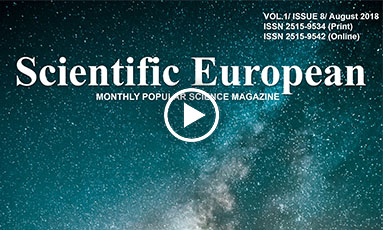Scientific European publish significant advances in science, research news, updates on ongoing research projects, fresh insight or perspective or commentary for dissemination to general people. The idea is to connect science to society. The scientists can publish an article about a published or an ongoing research project on a significant societal importance that the people should be made aware of. The published articles can be assigned DOI by the Scientific European, depending upon significance of the work and its novelty. SCIEU does not publish primary research, there is no peer-review, and articles are reviewed by the editors.
Scientific European is a magazine reporting significant recent advances in science to general audience.
They identify relevant original research articles published in reputed peer reviewed journals in the recent months and present the breakthrough discoveries in a simple language that is appreciable to general readers. The stories of recent advances in science and technology thus can reach to a general reader. This platform aids in disseminating the scientific information in a manner that is easily accessible and comprehensible to a general audience who would otherwise might be oblivious to its existence. This propagation of scientific knowledge to general people, particularly students and the young generation will contribute in popularizing science and may stimulate them intellectually to choose scientific research as a career.
The USP of the magazine is the availability at the end of the article of a list of sources with details and links to the original research articles, so that anyone interested can go and read the relevant research paper simply by clicking the link provided.
A potential area of improvement for the magazine would be to introduce videos and blogs related to the various discoveries and inventions as that will attract more young readers. The application of the news articles in everyday life can also be introduced.
This is a free access magazine; all articles and issues including the current one is freely downloadable from the website.
The topics covered are mostly from biological and medical sciences. At times, articles in physical and environmental sciences are also seen. However, articles related to general improvement of mind and body in relation to medical sciences can also be included to provide an overall health improvement perspective to the readers.
The focus is mainly to spread information and awareness and not unsurprisingly, there are no advertisements, sponsored contents or promotional materials.
***
ABOUT THE AUTHOR
Rajeev Soni PhD (Cambridge)

Dr Rajeev Soni holds a PhD in Molecular Biology from University of Cambridge where he was Cambridge Nehru and Schlumberger scholar. He is an experienced biotech professional and has held several senior roles in academia and industry.
The views and opinions expressed in blogs are solely those of the author(s) and other contributor(s), if any.




































